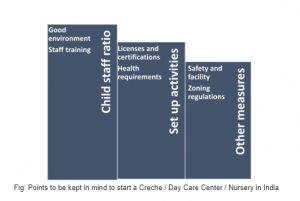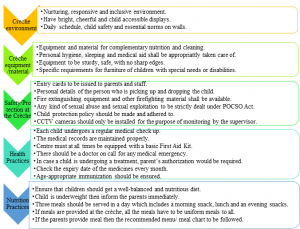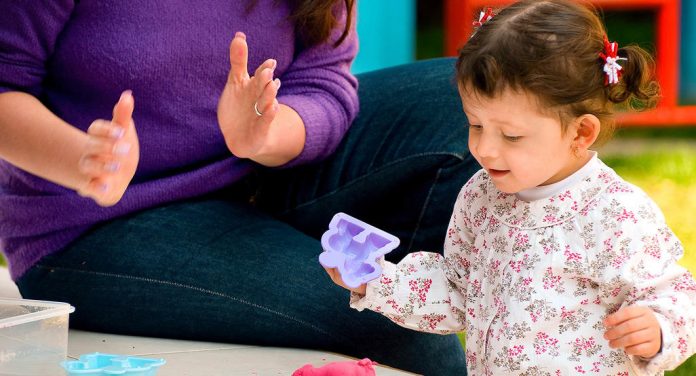This article has been written by Lakshmi Pillai, pursuing a Diploma in Advanced Contract Drafting, Negotiation, and Dispute Resolution from LawSikho.
Table of Contents
Introduction
Today, India is having more nuclear families compared to joint families. And working women in urban areas are increasing day by day. Therefore, 1 out of 4 children born in India does not have the proper support of a skilled attendant. While we are following western culture we also need to find answers to such issues. The parents in urban areas are left with three options. Either to call their parents to take care of their children until the child becomes independent. Or either having working hours with flexible timings. And the last option is to find an attendant to take care of the child on a part-time or full-time basis.
The last alternative becomes extinct if there is an issue of earning and cost of daycare professionals for the child. Therefore, one of the solutions which we see mushrooming in cities is daycare centres. As per the latest data (2019), the number of creches under the National Creche Scheme is 7930. And often working parents who are earning for their livelihood choose daycare centres for their children.
What is daycare?
The service of providing child care is known as daycare or childcare homes. There are some usual characteristics that distinguish the day-care homes from the other institutions. The general characteristics of the daycare are as follows:
- Target child age – group – 0-6 years of age child.
- Daycare timings – the timings vary, it can be run for 4-6 hours, 6 days a week.
- Total size – the size of the per bath can be 20-40 children (as per facilities and staff)
- Institution of an organisation – it can be instituted on a profit basis, proprietorship, or partnership basis.
- Regulations – there are no specific regulations for such institutions.
- Staff – Mostly female staff is preferred. The staff can include the founders, ECCE (Early childhood care and education) qualified teachers, and supporting caregivers.
Types of daycares
As there is a huge demand for daycares in cities, we can see various types of daycare institutions in the city. The types of daycares are as follows:
- Workplace daycares: In this type of daycare, onsite daycares are present in the companies where the parent is working. Parents can take their children to work and drop them at the daycare facility provided by the company. These daycare facilities are more prevalent in foreign countries.
- Daycare attached to school – This type of daycare centre is attached to a school. Therefore more qualified teachers are there to handle the child.
- Daycare based on homes – This is commonly seen in India, the caretakers run a daycare in their home itself. This kind of daycare system generally occupies a small number of children. They are run by homemakers with the help of a few assistants.
- Private daycare – Private daycare is run by individuals or a group of individuals. They will arrange the place and staff. They manage the daycare. As per space and facilities, they decide the strength of children be accommodated per batch.
- Private daycare chains – These are franchises that are run by the same management at different places with the same rules and regulations. They will have a staff group for each branch. The total number of children managed will be quite larger in comparison to other types of daycare systems. Example – Eurokids, Kangaroo kids, etc.
Importance of daycare
From the parents’ perspective, having a good daycare is important so they can assure that their children are safer. A parent who is working gets disordered while balancing their life with work. So having a trained institution to take care of the child will help the parent to have a work-life balance. A first-time parent may not be aware and know how to train their kids. Admitting the child to daycare will benefit the child to get specialised care and develop required skills in them.
A good daycare is important from the perspective of children as well. The child will be able to develop himself socially, emotionally, and physically in the environment of daycare. As there are trained professionals in the daycare, they know how to improve motor control of the child and inculcate good habits in the child (for eg: toilet training). Going to daycare will also help the kid to improve his social interaction skills. Admitting a child to daycare will also help the child to be independent and reduce the chances of separation anxiety from parents.
Checklist to start a crèche/daycare center/nursery in India

- A good environment- To start a daycare centre choose a place which is a little far from the chaos of the city. A good environment will surely affect the child. Prioritizing a clean and greener place is suitable.
- Staff training- The staff who are recruited for the daycare shall be well trained before they get engaged with children. It is important to make them learn about child psychology, behaviour, and health priorities that need to be taken care of while dealing with the children.
- Licenses and certifications for daycare – Licenses, and certification is proof of quality. There are various courses available on the net which train child care teachers. The staff can take such courses and train themselves.
- Health requirements – First aid and CPR (cardiopulmonary resuscitation) certification shall be obtained from the respective authorities. It is not mandatory though, but it is always good to have training on such requirements.
- Safety and facility checks – This is an important step that should be a huge concern for the daycare centre. To let children roam freely around the crèche, all safety measures should be taken care of before starting. Regular checks are required to be carried out indoor and outdoor.
Some safety and facility checks are as follows
- There should be a specific number of square feet per child.
- Necessary amenities include – fenced play area, ventilation, and kitchen away from children’s direct access, good lighting, proper heating, and air conditioning.
- Good sanitation facilities should be available for children.
- Separate sanitation facilities for children and staff.
- The daycare is better to be established at a place away from the main road.
- There should be security personnel at the gate.
- The daycare shall be equipped with toys that do not harm children’s health.
- Zoning regulations – Before starting the crèche, you should check whether the place where you are planning to open the crèche is permitted as per municipality or town planning rules. A certification from the proper authority is a must.
- Child staff ratio – A crowded child care centre can harm the child. It will hamper the learning process of the child and is considered unsafe. There shall be a minimum staff to be present in the classrooms. The ratio of child staff can be varied based on the age of the children.
- Set up activities – The child daycare centre shall organise a different set of activities for different age groups. There shall be physical development activities, social activities, reading activities, creative activities, etc.
- Other measures – The child daycare centre can create a list of the daily programs and food menu list for each group of children as per their age. A guide for parents can also be prepared in which certain requirements are required to comply with specifications and explanations.
The legal mandate of daycare/ crèches under various Acts of India
As per the current status, India still does not have an Act that especially lays down rules regarding daycare institutions. However, there was an amendment made in the Maternity Benefits Act, 1961, which states that establishments that have more than 50 or more employees shall necessarily create crèche facilities for women employees. It is to be noted that, as per the amendment made out in the Act to date there are no rules made for its implementation.
There are various other Acts in which crèches are mandated:
- Factories Act, 1948.
- The Building and other Construction Workers (Regulation of Employment & Conditions of Service) Act, 1996.
- The Mines Act: The Mines Crèche Rules, 1966.
- Inter-State Migrant Workmen (Regulation of Employment & Conditions of Service) Central Rules, 1980.
- Plantations Labour Act, 1951.
- The Mahatma Gandhi National Rural Employment Guarantee Act (MGNREGA), 2005.
- Maternity Benefit (Amendment) Act, 2017.
Guidelines for setting up and running a crèche facility under the Maternity Benefit Act 2017
The Ministry of Women and Child Development Government of India has provided some guidelines under Section 111 A of The Maternity Benefit (Amendment) Act, 2017, which was effective from 1st July 2017. The scheme is named as ‘National Creche Scheme’. The guidelines for setting up and running a crèche facility under the scheme are as follows:
- A group of children from 6 months to 6 years is eligible to get protection under these guidelines.
- These guidelines apply to all employee’s children who are working as:
- Temporary,
- Daily wage,
- Consultant, and
- Contractual personnel.
- The crèche location shall be within 500 meters from the worksite.
- The crèche timings shall be eight to ten hours a day. If there are shifts in the workplace then accordingly timings shall be made which can suit the parent and the child.
Infrastructure of crèche
- More preferable on the ground floor.
- The centre should be made of concrete (pakka) structure.
- A minimum space of 10 to 12 sq. ft. per child.
- The room should have proper light, no unsafe places shall be present nearby crèche like a drain, pits, etc, availability of safe and potable drinking water, demarcated different areas shall be there for the different age group of children.
- The guidelines also provide norms and standards to be followed in a crèche. Some are mentioned below in the form of a chart:

Conclusion
There is no specific central legislation that covers the daycare institution. The guidelines provided by the Ministry of Women and Child Development, Government of India are quite laudable. However, these guidelines are rarely followed in daycare centres. An authority to check the implementation will be quite helpful for the workers.
References
- https://www.franchiseindia.com/education/How-to-start-a-daycare.9365
- https://blog.firstcrayon.com/the-essential-guide-to-daycare-in-india-c2c775ef60d2
- https://www.theokids.in/rules-and-regulations-for-running-a-creche-in-india.html
- https://www.opencompanysingapore.com/opening-a-daycare-center-for-children-in-singapore
- https://wcd.nic.in/sites/default/files/National%20Minimum%20Guidelines.pdf
Students of LawSikho courses regularly produce writing assignments and work on practical exercises as a part of their coursework and develop themselves in real-life practical skills.
LawSikho has created a telegram group for exchanging legal knowledge, referrals, and various opportunities. You can click on this link and join:
 Serato DJ Crack 2025Serato DJ PRO Crack
Serato DJ Crack 2025Serato DJ PRO Crack










 Allow notifications
Allow notifications


